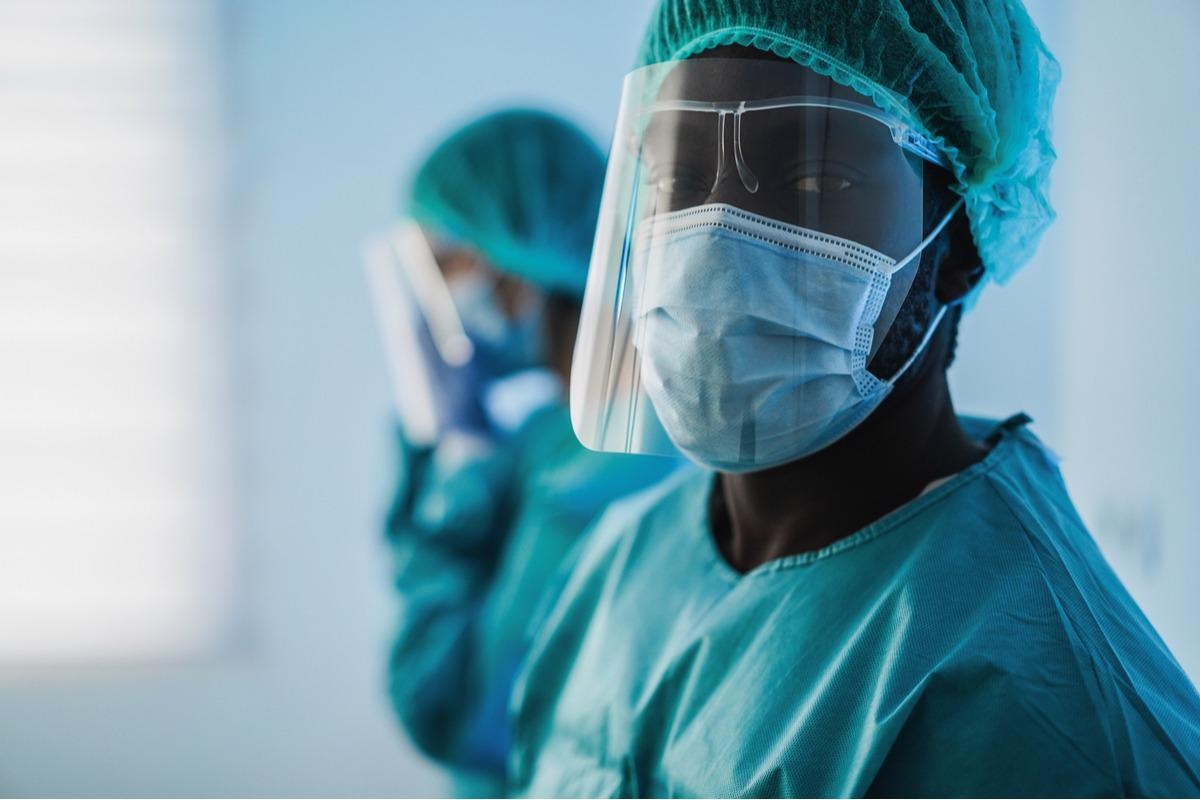In a recent study posted to the medRxiv* preprint server, researchers evaluated healthcare workers (HCW) in South Africa, presenting with severe acute respiratory syndrome coronavirus 2 (SARS-CoV-2) symptoms, for Omicron variant infection.
 Study: SARS-CoV-2 Omicron symptomatic infections in previously infected or vaccinated South African healthcare workers. Image Credit: DisobeyArt/Shutterstock
Study: SARS-CoV-2 Omicron symptomatic infections in previously infected or vaccinated South African healthcare workers. Image Credit: DisobeyArt/Shutterstock
The team further determined the coronavirus disease 2019 (COVID-19) vaccine-induced protection and natural infection-induced protection against the Omicron variant of SARS-CoV-2.
Background
The SARS-CoV-2 Omicron variant was first reported in South Africa in late November 2021. By December 2021, Omicron constituted 98% of the SARS-CoV-2 infections detected in South Africa while the variant rapidly spread worldwide.
The Ad26.COV.2 COVID-19 vaccine was offered to the HCWs in South Africa in connection with the Sisonke trial from February 17, 2021, as a single dose regimen, and a booster was offered to HCWs from November 8, 2021. Further, the HCWs in South Africa had access to the BNT162b2 SARS-CoV-2 vaccine as part of the national vaccination campaign from May 2021.
About the study
In the present study, scientists assessed SARS-CoV-2 Omicron infection among HCWs in Johannesburg, South Africa, presenting with COVID-19 symptoms such as fever, sore throat, cough, shortness of breath, and myalgia between November 24 and December 31, 2021. Further, the team investigated the impact of the previous nucleic acid amplification test (NAAT)-confirmed SARS-CoV-2 and COVID-19 vaccinations in preventing Omicron infection.
Blood samples of the subjects were collected either during their symptomatic visit or in a visit three months earlier, with the tests being used to determine anti-spike (S) immunoglobulin G (IgG) levels.
Behavioral, health, and demographic questionnaires collected personal data including COVID-19 vaccination history. Furthermore, the history of SARS-CoV-2 infection was determined by either self-reporting or documented NAAT positivity of the participants.
Findings
The results indicated that among the 433 HCWs with symptomatic SARS-CoV-2 infection, 43.9% had the Omicron infection, 16.7% were unvaccinated against COVID-19, 62.4% had received one dose of the Ad26.COV.2 vaccine, 6.3% were two-dose BNT162b2 vaccinated 14 days or more before the symptomatic visit, and 11.8% received a booster dose 14 days or more ahead of the symptomatic visit.
Vaccination coverage was comparable among HCWs with symptomatic SARS-CoV-2 who had been diagnosed with Omicron and those who had not. HCWs who were Ad26.COV.2-vaccinated and unvaccinated individuals displayed no differences in the odds of identification of Omicron infection. The number of BNT162b recipients in the study population was lower than the Ad26.COV.2 recipients.
A total of 154 HCWs had at least one previous incidence of NAAT-confirmed COVID-19 before November 2021, of which 53 had reinfections with Omicron. In contrast, of 279 HCWs without a history of NAAT-confirmed SARS-CoV-2 infection, 137 had the Omicron infection. Thus, COVID-19 convalescents had a lower risk of Omicron infection than those without a history of COVID-19.
Additionally, subjects who had COVID-19 during the third pandemic wave had a lower risk of symptomatic Omicron infection than those without a history of NAAT-confirmed SARS-CoV-2. Although not significant, those HCWs who had SARS-CoV-2 during the second pandemic wave had a lower risk of being infected with Omicron in the study period.
The SARS-CoV-2 anti-S IgG geometric mean units measured in 267 HCWs indicated a lower level in HCWs with Omicron infection (577 binding antibody unit (BAU)/mL) than those who had never had a SARS-CoV-2 infection (968 BAU/mL).
Further, HCWs with a history of NAAT-confirmed SARS-CoV-2 and those with anti-S IgG levels of more than 1549 BAU/mL exerted a significant modulating effect on Omicron infections, with only a 33% chance of Omicron infection, according to the conditional inference tree built in the study.
Conclusions
The study findings indicated a high rate of reinfection and vaccine breakthrough infection among the HCWs infected with the SARS-CoV-2 Omicron variant. A high level of SARS-CoV-2 anti-S IgG and prior incidence of COVID-19 demonstrated a substantial protective effect against Omicron infection. Further, the study indicated that previous SARS-CoV-2 infection prevented symptomatic Omicron reinfections by 45-60%, which was in line with a study conducted in Qatar.
Those HCWs who did not demonstrate Omicron infection during the initial five weeks of the study had more than 1549 BAU/mL of anti-S IgG levels, indicating the protective effect of neutralizing antibodies against symptomatic Omicron. These findings were in contrast with previous studies reporting the reduced SARS-CoV-2 natural infection-induced or vaccine-induced antibodies for neutralizing Omicron, due to the significant immune evasion of the Omicron variant.
SARS-CoV-2 convalescent HCWs, irrespective of their vaccination status and those who received vaccines recently, exhibited higher levels of protection against Omicron infection, compared to unvaccinated and single-dose Ad26.COV.2-vaccinated HCWs, given that most subjects were vaccinated eight months before the study, and hence, demonstrated lower anti-S IgG levels.
*Important notice
medRxiv publishes preliminary scientific reports that are not peer-reviewed and, therefore, should not be regarded as conclusive, guide clinical practice/health-related behavior, or treated as established information.
- Marta Nunes, Sthembile Sibanda, Vicky Baillie, Gaurav Kwatra, Ricardo Aguas, Shabir Madhi. (2022). SARS-CoV-2 Omicron symptomatic infections in previously infected or vaccinated South African healthcare workers. medRxiv. doi: https://doi.org/10.1101/2022.02.04.22270480 https://www.medrxiv.org/content/10.1101/2022.02.04.22270480v1
Posted in: Medical Science News | Medical Research News | Medical Condition News | Disease/Infection News
Tags: Antibodies, Antibody, Blood, Coronavirus, Coronavirus Disease COVID-19, Cough, covid-19, Fever, Healthcare, Immunoglobulin, Nucleic Acid, Omicron, Pandemic, Respiratory, SARS, SARS-CoV-2, Severe Acute Respiratory, Severe Acute Respiratory Syndrome, Sore Throat, Syndrome, Throat, Vaccine

Written by
Shanet Susan Alex
Shanet Susan Alex, a medical writer, based in Kerala, India, is a Doctor of Pharmacy graduate from Kerala University of Health Sciences. Her academic background is in clinical pharmacy and research, and she is passionate about medical writing. Shanet has published papers in the International Journal of Medical Science and Current Research (IJMSCR), the International Journal of Pharmacy (IJP), and the International Journal of Medical Science and Applied Research (IJMSAR). Apart from work, she enjoys listening to music and watching movies.
Source: Read Full Article
